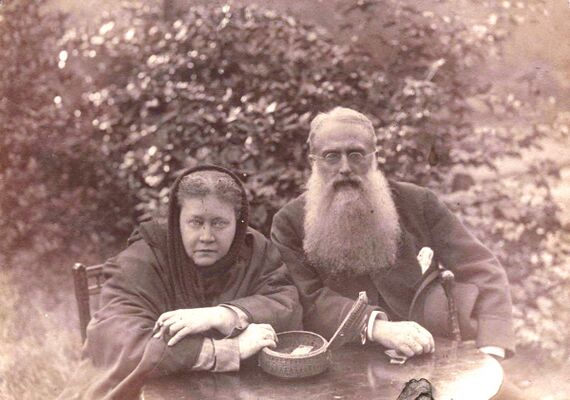174...
FOOTNOTES TO “A BUDDHIST PRINCE’S VIEW OF THE UNIVERSE AND THE NATURE OF MAN”
[This essay was contributed by His Royal Highness, Prince Chandrdhat Chudhathar of Siam, and was published simultaneously in The Theosophist (Vol. X, November, 1888, pp. 83-87). Various footnotes were appended by H.P.B. to certain passages which appear in square brackets.]
[This Akasa (or Universe) although it is self-existing, absolute, infinite is yet subject to the immutable law of change.]
A contradiction. A thing cannot be absolute and still subject to change. What H.R.H. means to say, we suppose is that space or the abstract universe (Akasa) is infinite . . . . . . and immutable; but that this universe is subject to changes in its periodical manifestations.
[if this solar system. . . . were to be destroyed . . . . . . the matter which constitutes their bodies will. . . . be turned into elements ....other systems of heavenly bodies. . . .will naturally. . . . form out of the molecules of matter and dormant forces a new system to supply the vacancy.]
175 This is certainly not orthodox exoteric Buddhism. But it comes very near to our esoteric philosophy or “Budhism” (Wisdom religion) taught by our Lord secretly to his elect Arhats.
[by virtue of the living species, new beings are made up by the attractions of their affinities from the remains of those which have died long before.]
This is precisely the doctrine taught (See The Secret Doctrine, Vol. II) with regard to the animal world, of which all the bodies of mammals have been formed out of the cast off atoms of various mankinds which preceded ours. Animals were “created” later than Adam and brought to him to be named (Vide, Chap. ii, Genesis). In the Purânas, it is the various Rishis who are the reputed parents of divers animals and even of birds and amphibious monsters.
[What I call a soul is nothing but the active force or attraction in man which, when he dies, must die with him.]
This is too materialistic—we fear. The “Soul” is certainly not immortal, but the ETERNAL KARMIC EGO, that which re-incarnates, is. This is esoteric philosophy, of course, not orthodox Buddhism.
[if there exists an objective Nirvana] No “objective Nirvana” can exist in Nature. Nirvana is a state, not a mode of visible objectiveness, nor a locality. Nirvana, as Nagasena said to the king, IS—but does not exist.
[I am unable to believe that an immortal soul exists] His Royal Highness is evidently unacquainted with esoteric philosophy. The latter believes neither in a God who fabricates souls out of nothing, nor that there is such a thing as any place “outside” the Universe, since the Universe is infinite and limitless. But we must also demur to the idea that SPACE can ever be “used up,” whether during Manvantara (or life cycle) or during pralaya, the period of absolute Rest, when SPACE remains the same, i.e., eternal, immutable, as it ever was and as 176it will ever be, since abstract SPACE is but another name for the absolute ALL.
[let us strive to cultivate an universal love, which will undoubtedly tend to good actions, the only tools with which we can paint our perfect likenesses at death.]
KARMA, TANHA and SKANDHAS, are the almighty trinity in one, and the cause of our re-birth. The illustration of painting our own present likeness at death, and that likeness becoming the future personality is very poetical and graphic, but we claim it as an occult teaching. What H.R.H. means to infer, as we understand it, is this. At the solemn moment of death no man can fail to see himself under his true colours, and no self-deception is of any use to him any longer. Thence the following thing happens. As at the instant of drowning man sees marshalled past his mind's eye the whole of his life, with all its events, effects and causes, to the minutest details, so at the moment of death, he sees himself in all his moral nakedness, unadorned by either human flattery or self-adulation, and, as he is; hence, as he, or rather, as his astral double combined with his Kama principle—shall be. For the vices, defects and especially the passions of the preceding life become, through certain laws of affinity and transference, the germs of the future potentialities in the animal soul (Kama rupa), hence of its dependent, the astral double (linga śarira)––at a subsequent birth. It is the personality alone which changes; the real reincarnating principle, the EGO, remains always the same; and it is its KARMA that guides the idiosyncracies and prominent moral traits of the old “personality” that was (and that the EGO knew not how to control), to re-appear in the new man that will be. These traits and passions pursue and fasten on the yet plastic third and fourth principles of the child, and—unless the EGO struggles and conquers—they will develop with tenfold intensity and lead the adult man to his destruction. For it is they who are the tools and weapons of the Karmic LAW OF RETRIBUTION. Thus, the Prince says very truly that our good and bad
177 actions “are the only tools with which we paint our likenesses at death,” for the new man is invariably the son and progeny of the old man that was.
